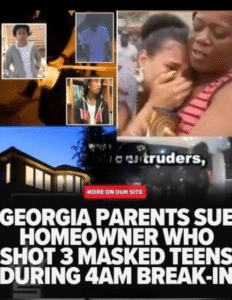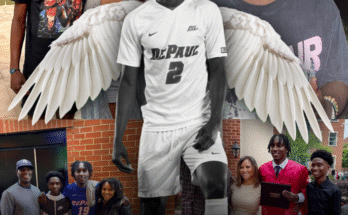Georgia Parents Sue Homeowner After He Fatally Shoots 3 Masked Teens Who Broke In Armed At 4AM – Despite Self-Defense Ruling
In a case stirring national debate, the parents of three teenagers who were fatally shot while allegedly breaking into a Georgia home at 4 a.m. are suing the homeowner, demanding what they call “justice” for their children—even after authorities ruled the incident was an act of self-defense.
The shooting occurred in Clayton County, just south of Atlanta, when a homeowner awoke in the early morning hours to find three masked intruders armed with weapons attempting to break into his property. According to the police report, the teens—ages 15, 16, and 17—were carrying firearms and wearing face coverings. The homeowner, fearing for his life, opened fire, striking all three. Authorities later confirmed that at least one of the teens fired a shot during the confrontation.
Police ruled the shooting justified under Georgia’s “Stand Your Ground” law, which allows individuals to use deadly force to protect themselves against a perceived imminent threat. The homeowner was not charged.
Despite the legal ruling, the families of the deceased teens are pursuing a civil lawsuit. They argue that the homeowner used excessive force and should have attempted to de-escalate the situation or call police before firing. “These were children,” said one mother during a press conference. “They made a mistake, but they didn’t deserve to die like that. We want justice.”
Critics of the lawsuit argue that the teens made a conscious decision to arm themselves and attempt a break-in, knowing the risks involved. Supporters of the homeowner say he had every right to protect his home and family, especially in the dead of night when his life was in clear danger.
Legal experts note that while a self-defense ruling may protect someone from criminal prosecution, it doesn’t automatically shield them from a civil lawsuit. The court will now have to decide whether the use of deadly force, although legal, was reasonable under the circumstances from a civil liability standpoint.
The case has sparked heated discussions online and in the media about gun rights, property defense, and the line between justice and tragedy. While some sympathize with the grieving parents, others argue that actions have consequences—even for teenagers.
As the lawsuit moves forward, both sides remain steadfast. The homeowner says he has no regrets and acted only to protect himself. The families of the teens say their sons should still be alive. The court will ultimately decide whether the law’s protection of self-defense also shields him from financial or legal responsibility in civil court.
This case could set a new precedent in how “Stand Your Ground” laws intersect with civil litigation—especially when minors are involved.
